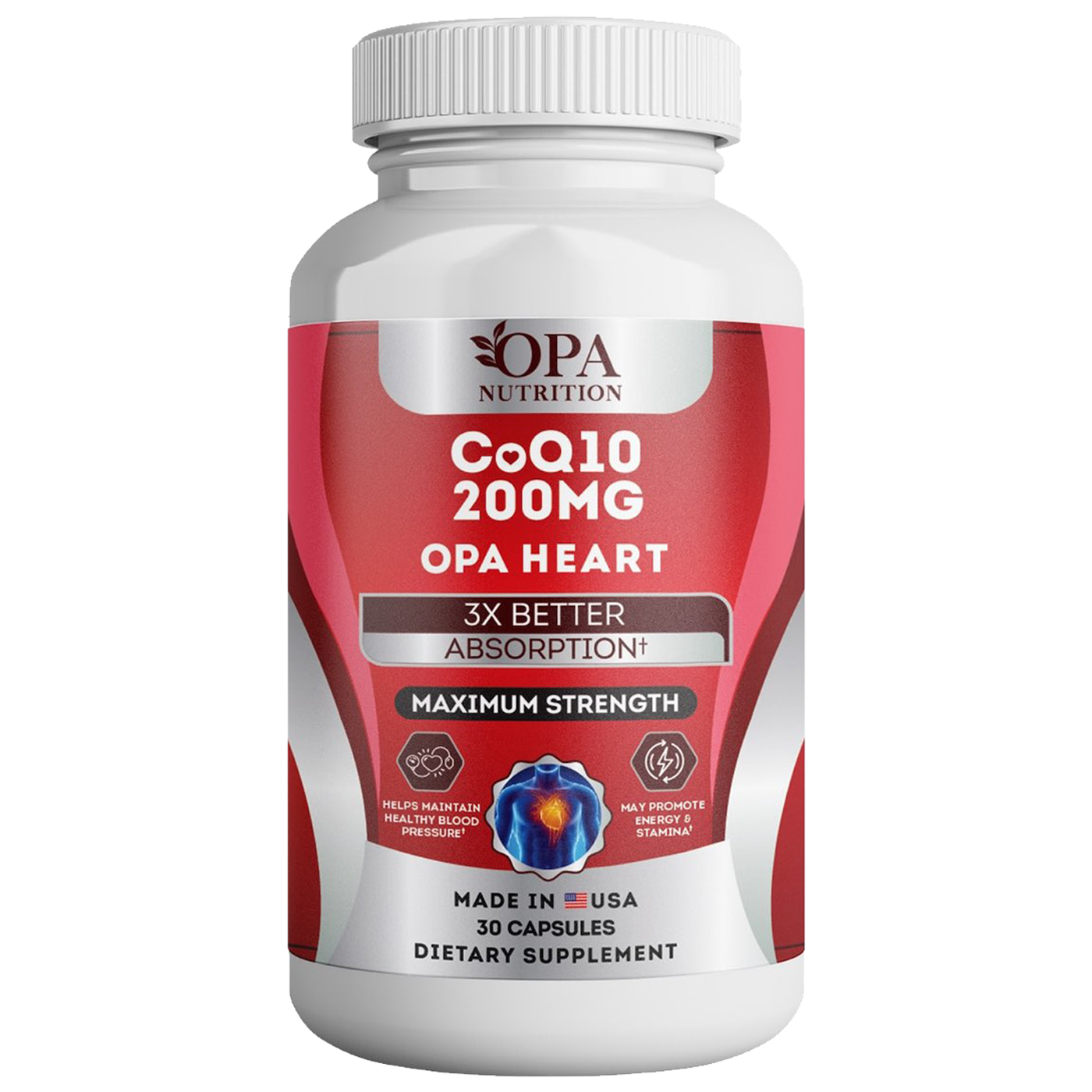CoQ10 for Migraines: Migraine headaches are not only painful, but they can also significantly impact a person's quality of life. With millions of people affected worldwide, finding effective treatments and preventive measures is essential. But did you know that Coenzyme Q10 (CoQ10), a naturally occurring compound in our bodies, may hold the key to reducing the frequency and severity of migraines headaches? In this blog post, we will delve into the science behind CoQ10, explore its benefits, and provide practical tips for choosing the right supplement to help keep migraines at bay.
Migraine sufferers are often in search of natural alternatives to conventional medications, which can sometimes cause unwanted side effects or fail to provide adequate relief. In the following sections, we will discuss the benefits of co q10 for migraines, including its connection to migraine prevention, the science behind its migraine-relieving effects, and how to choose the best CoQ10 supplement.
Additionally, we will touch on alternative natural remedies and lifestyle changes that can further support migraine management.
Short Summary
- CoQ10 has been linked to migraine prevention and relief, with potential benefits for cellular health without unwanted side effects.
- Clinical studies have shown CoQ10 to be effective in reducing the frequency and severity of migraine attacks.
- Alternative natural remedies such as magnesium, riboflavin supplementation, lifestyle changes & stress management can help reduce migraine symptoms & frequency.

OPA Heart
The #1 CoQ10 for Heart Health
Understanding CoQ10 and Migraines

CoQ10, or coenzyme Q10, is a crucial compound found in the mitochondria of all human cells. Its primary role is to assist in the conversion of nutrients into energy, which is essential for our cells to function properly. Along with its importance in energy production, CoQ10 has been linked to migraine prevention and relief, offering a potential alternative to traditional migraine medications.
Organizations such as the American Headache Society, the American Academy of Neurology, and the Canadian Headache Society have expressed confidence in the safety and potential efficacy of CoQ10 for prophylactic migraine therapy. With these endorsements and the growing body of research supporting CoQ10's benefits, it is no surprise that more people are turning to this natural compound as part of their migraine prevention strategy.
CoQ10's Role in Energy Production
CoQ10 plays a vital role in our body's energy production process. It is an essential component of the electron transport chain, which generates energy in the form of adenosine triphosphate (ATP). This energy is required for our cells to carry out various processes, including repairing damaged cells and maintaining overall health.
In addition to its role in energy production, CoQ10 also acts as an antioxidant, protecting our cells and tissues from damage caused by free radicals. This dual function of CoQ10 highlights its importance in maintaining overall cellular health and may explain its potential benefits for migraine prevention.
The Connection Between CoQ10 and Migraine Prevention
Research indicates that CoQ10 may help reduce the occurrence and intensity of migraines, as well as the duration of episodes. One study published in the journal Neurology found that participants who took 100 milligrams (mg) of CoQ10 three times a day for three months reported around 50% fewer migraine attacks than those who took a placebo. A 2019 review of studies reported similar findings, suggesting that CoQ10 may be a viable option for migraine prevention.
Given the prevalence of migraines and the potential side effects associated with conventional migraine medications, the discovery of CoQ10's benefits offers a promising alternative for those in search of natural migraine prevention strategies. By supporting energy production and cellular health, CoQ10 may provide relief for migraine sufferers without the unwanted side effects of traditional medications.
The Science Behind CoQ10 for Migraines Relief

The potential migraine-relieving effects of CoQ10 can be attributed to its antioxidant properties and ability to reduce inflammation. These characteristics have been shown to be beneficial for migraine sufferers, as inflammation and oxidative stress are thought to play a role in the development of migraine attacks.
In the next sections, we will delve deeper into the antioxidant and anti-inflammatory properties of CoQ10, as well as present the clinical studies that support its use for migraine relief. By understanding the science behind CoQ10, migraine sufferers can make informed decisions about incorporating this natural compound into their treatment plan.
Antioxidant Properties and Inflammation Reduction
CoQ10 is a lipid-soluble antioxidant, which means it can readily dissolve in fats and protect our cells and tissues from damage caused by free radicals. Free radicals are unstable molecules that can cause oxidative stress, which has been linked to the development of various health conditions, including migraines. CoQ10's antioxidant properties can help counteract oxidative stress and reduce inflammation, which may be beneficial for migraine prevention.
One of the mechanisms by which CoQ10 may help prevent migraines is by reducing the levels of calcitonin gene-related peptide (CGRP). CGRP is a peptide in the brain that is associated with pain and inflammation. By lowering CGRP levels, CoQ10 may help alleviate the underlying causes of migraine attacks and provide relief for sufferers.
Clinical Studies on CoQ10 for Migraines
Clinical studies have demonstrated the effectiveness of CoQ10 in reducing the frequency and severity of migraine attacks. For example, a study published in the journal Neurology found that participants who took 100 mg of CoQ10 three times a day for three months experienced around 50% fewer migraine attacks than those who took a placebo. Another study involving pediatric and adolescent migraine sufferers yielded similar results, with CoQ10 supplementation leading to a significant reduction in headache frequency.
These clinical studies provide strong evidence for the potential benefits of CoQ10 in migraine prevention and relief. For individuals who experience migraines and are seeking alternative treatment options, CoQ10 supplementation may offer a promising and natural solution.
Choosing the Right CoQ10 Supplement

When considering CoQ10 supplementation for migraine prevention, it's important to choose the right form, dosage, and quality of the supplement. Various factors can influence the effectiveness of CoQ10 supplementation, and understanding these factors can help ensure that you select the best product for your needs.
In the following sections, we will discuss the differences between ubiquinone and ubiquinol (two forms of CoQ10), the recommended dosage and timing for migraine prevention, and the importance of selecting a high-quality and pure CoQ10 supplement.
Forms of CoQ10: Ubiquinone vs. Ubiquinol
Ubiquinone and ubiquinol are two forms of CoQ10, with the latter being more easily absorbed by the body. Ubiquinone is the oxidized form of CoQ10, while ubiquinol is the reduced form that is ready to act in cellular processes. The body is capable of converting CoQ10 between these two forms, but it is believed that ubiquinol is more readily absorbed and utilized by the body.
When choosing a CoQ10 supplement, it may be beneficial to opt for the ubiquinol form, as it is the active form that is utilized in cellular processes. However, it is important to consult with a healthcare provider to determine the best form and dosage for your specific needs.
Recommended Dosage and Timing
The recommended dosage of CoQ10 for migraine prevention is 100 mg taken three times per day. However, the optimal dosage may vary depending on individual factors such as age, weight, and medical history. Therefore, it is essential to consult with a healthcare provider for personalized dosing recommendations.
In addition to the dosage, it is important to consider the timing of CoQ10 supplementation. Some studies suggest that taking CoQ10 with a meal containing fat may improve absorption and enhance its effectiveness. Be sure to discuss the optimal timing for CoQ10 supplementation with your healthcare provider.
Quality and Purity Considerations
When selecting a CoQ10 supplement, it is crucial to choose a product that is pure and free of contaminants. This will ensure that you receive the maximum benefits from CoQ10 supplementation and minimize the risk of potential side effects.
Look for reputable brands and products that have undergone third-party testing for quality and purity.
Potential Side Effects and Interactions

While CoQ10 is generally considered safe, it is important to be aware of potential side effects and interactions with certain medications and conditions. Most people experience few, if any, side effects from CoQ10 supplementation. However, some individuals may experience mild side effects such as nausea, diarrhea, and headaches.
In the following sections, we will discuss the common side effects associated with CoQ10 supplementation, potential drug interactions, and precautions for pregnant and breastfeeding women.
Common Side Effects
Common side effects associated with CoQ10 supplementation include nausea, diarrhea, and headaches. These side effects are generally mild and tend to resolve on their own.
However, if you experience persistent or severe side effects, it is important to consult with your healthcare provider to determine if CoQ10 supplementation is appropriate for you.
Drug Interactions
CoQ10 may interact with certain medications, such as blood thinners and blood pressure medications, including warfarin and clopidogrel.
If you are taking any medications, it is important to consult with your healthcare provider before starting CoQ10 supplementation to avoid potential interactions and adverse effects.
Precautions for Pregnant and Breastfeeding Women
CoQ10 is not recommended for pregnant or breastfeeding women, as its safety and effectiveness during pregnancy and lactation have not been well-established.
If you are pregnant or breastfeeding, it is important to consult with your healthcare provider before considering CoQ10 supplementation.
Alternative Natural Remedies for Migraines

In addition to CoQ10, there are other natural remedies and lifestyle changes that can help alleviate migraine symptoms and reduce the frequency of attacks. These alternatives can be used in conjunction with CoQ10 supplementation or as stand-alone strategies for migraine prevention.
In the following sections, we will discuss the benefits of magnesium and riboflavin supplementation, as well as lifestyle changes and stress management techniques that can further support migraine management.
Magnesium
Magnesium is an essential mineral that plays a key role in nerve and muscle function, among other crucial processes in the body. Studies have shown that individuals who experience migraines tend to have lower levels of magnesium than those who do not suffer from headaches. As a result, magnesium supplementation has been suggested as a potential strategy for migraine prevention.
The recommended dosage of magnesium for migraine relief is 400-500 mg per day, with magnesium glycinate being the suggested form for supplementation. This form of magnesium is easily absorbed by the body and is less likely to cause gastrointestinal side effects compared to other forms of magnesium.
Riboflavin
Riboflavin, also known as vitamin B2, is an essential nutrient that plays a role in converting food into energy. Research has shown that taking riboflavin supplements can reduce the frequency and severity of migraine headaches. It is believed that riboflavin may help to reduce oxidative stress related to migraines, further supporting its potential as a natural migraine remedy.
For migraine relief, a daily dosage of 400 mg of riboflavin is recommended. As with any supplement, it is important to consult with your healthcare provider to determine the appropriate dosage and form of riboflavin for your specific needs.
Lifestyle Changes and Stress Management
Lifestyle changes and stress management techniques can also play a significant role in reducing the frequency and severity of migraine attacks. Regular physical activity, a balanced diet, proper hydration, and adequate sleep have all been shown to help alleviate migraine symptoms and prevent future attacks.
In addition to these lifestyle modifications, implementing relaxation techniques such as yoga, meditation, and deep breathing exercises can help manage stress and reduce the risk of migraine attacks. By incorporating these natural strategies into your daily routine, you can take a proactive approach to managing migraine symptoms and improving your overall quality of life.
Summary
In conclusion, CoQ10 holds promise as a natural remedy for migraine prevention and relief. Its role in energy production and antioxidant properties may help reduce the frequency and severity of migraine attacks, providing an alternative to conventional medications. When considering CoQ10 supplementation, it is important to choose the right form, dosage, and quality of the supplement to ensure optimal results.
In addition to CoQ10 supplementation, incorporating other natural remedies such as magnesium and riboflavin, as well as adopting lifestyle changes and stress management techniques, can further support migraine management. As always, consult with your healthcare provider before starting any new supplement or treatment plan, and take control of your migraines with a proactive, natural approach.
Frequently Asked Questions
What are 3 vitamins for migraines?
The three vitamins commonly recommended for people with migraines are vitamin B2 (riboflavin), Coenzyme Q10 (CoQ10), and Butterbur/Feverfew. All three have been shown to provide some degree of relief from the symptoms associated with migraine.
Studies have found that taking 400 mg of riboflavin daily can reduce the frequency of migraine attacks by up to 50%. CoQ10 has been found to reduce the intensity of migraine headaches, as well as the duration of the attacks. Finally, Butterbur/Feverfew.
Does low CoQ10 cause migraines?
Research shows that people with migraine may have low levels of CoQ10, so there is a strong possibility that low CoQ10 levels can cause migraines.
However, further studies are needed to confirm the link between low CoQ10 for Migraines.
Therefore, some people may choose to take CoQ10 supplements to ensure they are getting enough of this important nutrient. However, it's always a good idea to speak with a healthcare professional before taking any new supplements, especially if you have any underlying health conditions or are taking medications.
When should you not take CoQ10?
It is important to note that CoQ10 should not be taken by people who are taking blood-thinning medications, insulin, or certain chemotherapy drugs without consulting a healthcare professional.
Moreover, people with chronic diseases such as heart failure, liver problems, or diabetes may need to avoid CoQ10. Therefore, it is best to talk to your doctor before taking any CoQ10 supplement.
How long does CoQ10 take to work for migraines?
For those suffering from migraines, CoQ10 may take up to several months to start taking effect. It is important to stay consistent with the supplement for a few months before deciding if it is working.
As the effects of CoQ10 on migraine relief vary between individuals, it is important to consult with your doctor before starting any treatment.



